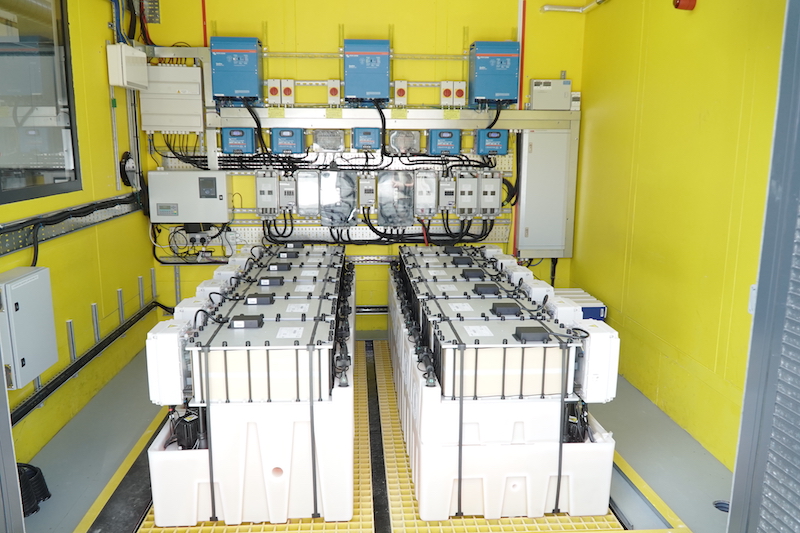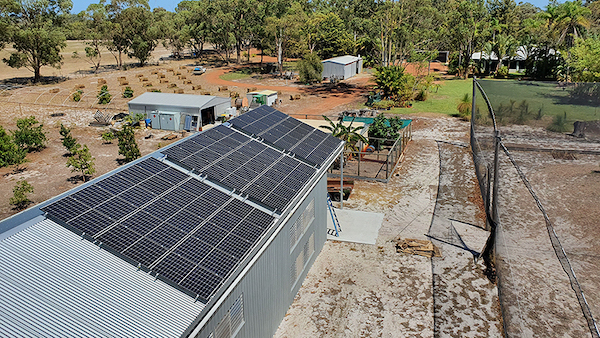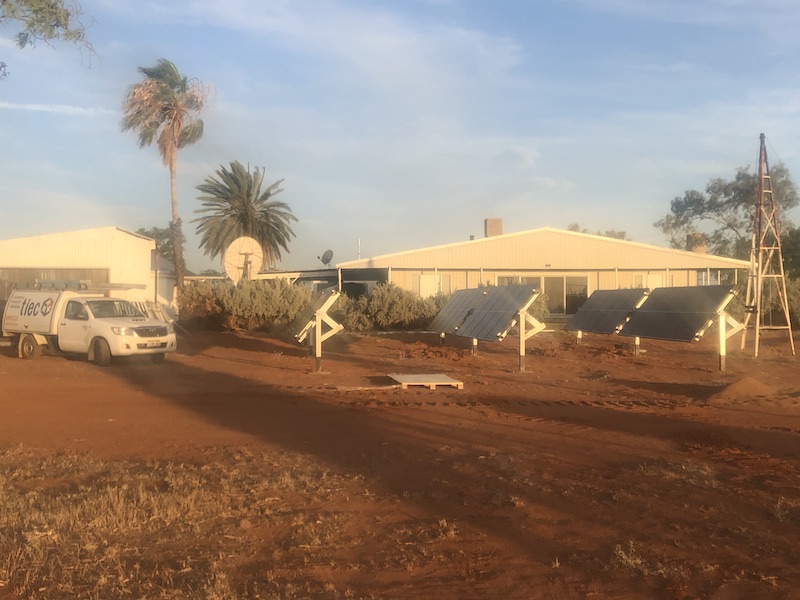Redflow

About Redflow
Redflow Limited, a publicly-listed Australian company (ASX: RFX), produces small 10kWh zinc-bromine flow batteries that tolerate daily hard work in harsh conditions. Redflow batteries are designed for high cycle-rate, long time-base stationary energy storage applications in the telecommunications, commercial & industrial and high-end residential sectors, and are scalable from a single battery installation through to grid-scale deployments. Redflow batteries are sold, installed and maintained by an international network of energy system integrators. Redflow’s smart, self-protecting batteries offer unique advantages including secure remote management, 100 per cent daily depth of discharge, tolerance of high ambient temperatures, a simple recycling path, no propensity for thermal runaway and sustained energy delivery throughout their operating life.
- Details
- In Redflow
- /

Swansea University, a research-led British university, has purchased Redflow’s unique ZBM2 zinc-bromine flow battery technology as the energy storage backbone for its Active Building demonstrator -– an award-winning classroom that generates, stores and releases solar energy at the point of use.
The microgrid is built around 120 kWh of Redflow batteries and is supplied with building-integrated, thin-film photovoltaic solar panels, as well as a solar wall that supplies the warm air to a heat-pump for space and water heating. Since being built, the classroom has proven the Active Buildings concept by generating more energy than it has used over an annual cycle, and during high solar summer months, the system will return power to the local electricity grid.
Redflow’s small 10 kWh flow battery units provided the only commercially available flow battery energy storage system that allowed accurate sizing for the 120 kWh system. Additionally, the Redflow battery operates “out of the box” with the Victron inverters and controllers that provide the power conversion for the Swansea University minigrid.
Tom Griffiths, Technology Transfer Fellow (Smart Systems), said Swansea selected the Redflow technology because of its ability to deliver 100% of the rated system energy every day, without degradation in capacity over a long – 10 year – life. “These characteristics were crucial considerations for us, and our application requires battery discharge duration of 4-8 hours depending on the time of year, making Redflow’s flow battery the ideal fit for our requirements in comparison to more conventional lead-acid or lithium alternatives.”
- Details
- In Redflow
- /

After losing power as the night horizon glowed orange with bushfires last summer, WA orchardists Jeff and Kerry Murray installed Redflow batteries to take their property off-grid and make it energy-independent year-round.
Power outages have plagued the Murrays’ farm - called Kalyakool, a Noongah word meaning “forever more” – since they bought the 34-hectare property near Gingin, 90km north of Perth, in 1994.
Mr Murray said the threat from the December bushfire was “the last straw”. “Our water comes from two bores, so without power, we can’t get any water,” he said. “The summer fire didn’t get to us, but it impinged on us through the loss of power for a whole day, which was followed by multiple outages as they brought it back on. If fire does reach us, we need energy to run the pumps to defend our property, which is why the bushfire was the last straw for us.”
- Details
- In Redflow
- /
 Solar panels installed at Yallalong Station in remote WAYallalong Station, a 348,000-hectare cattle property 650km north of Perth, has deployed a Redflow battery-based energy storage system to boost its energy independence and save thousands a year in diesel costs.
Solar panels installed at Yallalong Station in remote WAYallalong Station, a 348,000-hectare cattle property 650km north of Perth, has deployed a Redflow battery-based energy storage system to boost its energy independence and save thousands a year in diesel costs.
The cattle station, in the dry Murchison region northeast of Geraldton, can swelter for months in summer temperatures higher than 40 degrees Celsius - sometimes as high as 48 degrees Celsius.
Yallalong Station owner Lyndon Brown said a 24-hour power supply was essential to attract staff to work at this remote location. “If you want people to live out there in those isolated places, you do need 24-hour power to run all your fridges, air-conditioning and comforts of life that they expect,” he said.
More News...
- Rural Connectivity Group chooses Redflow for off-grid energy storage in New Zealand (11 November 2019)
- New Redflow partner predicts battery boom as WA solar tariffs end (26 September 2019)
- Redflow receives order for ZBM2 batteries to power rural microgrid in North West Tasmania (29 August 2019)
- Soul Energy partners with Redflow for infrastructure rollouts (21 May 2019)
- Redflow expands into China (17 May 2019)
- Redflow batteries supply energy for remote Thai village (13 February 2019)
- Redflow wins second South African telco battery sale (27 November 2018)
- Redflow batteries to power Optus mobile tower in Daintree rainforest (26 November 2018)
- Redflow batteries to store renewable energy for new children’s centres in Melbourne’s east (23 November 2018)
- Redflow supplies batteries for South African mobile phone towers (22 October 2018)
- Redflow Board gains manufacturing expertise (19 October 2018)
- Redflow recruits energy storage veteran to grow sales (02 October 2018)
- Redflow continues Board Renewal (11 September 2018)
- After turnaround year, Redflow aims for growth (30 August 2018)
- Darling Building beats energy shortfall with Redflow batteries (20 August 2018)
- Redflow batteries to power Fiji’s digital TV rollout (11 July 2018)
- Redflow manufactures complete batteries in Thailand (06 July 2018)
- Redflow cuts $1700 in power costs at holiday house (11 May 2018)
- Redflow raises A$18.1M to grow battery sales (26 April 2018)
- Redflow board pleased by Thai factory progress (29 March 2018)
Off the Cuff

Simon Hackett speaks about Formula E racing on ABC Radio Adelaide
Australian renewable energy investor Simon Hackett last week spoke to Radio ABC Adelaide's Afternoons host Sonya Feldhoff about the benefits for replacing the cancelled Adelaide 500 motor race with a...
Read more
Seven simple steps for mental health in time of coronavirus
After the summer bushfires, the coronavirus pandemic and associated economic shutdown, “unprecedented” must be a standout favourite for Macquarie Dictionary’s Word of the Year for 2020. For the first time...
Read more
John Harris talks (a bit) about International Albinism Awareness Day on ABC Radio
John Harris, who has the honorary role of PR guy for the Albinism Fellowship of Australia, was interviewed by Peter Goers on the Evenings show of ABC Radio Adelaide on...
Read more
Start-ups are key to the future of everything
Nigel Lake, Executive Chair of global business advisory firm Pottinger, will tell this week's Myriad start-ups festival in Brisbane, running May 16-19, that Australia needs start-ups to protect its prosperity. Pottinger...
Read moreContact
Impress Media Australia
P: +61 8 8431 4000
E: john@impress.com.au
W: www.impress.com.au
Street:
Impress Media Australia
313 Portrush Road,
Norwood SA 5067
Click here for our location
Postal:
Impress Media Australia
Box 95, Kensington Park
South Australia 5068
